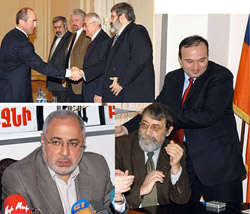Beginning in the previous two editions
During the years of 1988 and 1990, the then almost hundred year-old national political party-the Armenian Revolutionary Federation which is proud of the fact that it was the founder of the first independent Armenian republic but in no way accepts that it played a large role in the decline and loss of territories of that republic-feared and underestimated the gradually predominating independence tendencies during the Karabakh movement. At the time, the position of the ARF, which was “By being for independence, we will be against separation” was heard everywhere as a joke and was nothing more than a rush.
The Dashnaktsutiun was rushing even after its experience of 1918. It knew that you don’t acquire independence, as in 1990; rather you find it under the ruins of an empire, just like in 1918. They had to wait for that; wait and see when the great empire would collapse. And what if it didn’t collapse? What would happen to Karabakh whose case the many Dashanks in the Diaspora and the few in Armenia defended?
There were so many suspicions that the ARF didn’t even create an organization in Armenia, rather went by the name of NIPA, which as far as I know stood for National Independence Party of Armenia. If it weren’t for the collapse of the USSR, the NIPA could have easily been disbanded, hiding the trace of the ARF and then have it present itself with a federative, independence squad if there was a chance for independence. This was, evidently, an organizational method for the “By being for independence, we will be against separation” position.
“All Armenians are Dashnaks,” said one of the members of NIPA who was my colleague at the time. “Some realize it, some don’t.” He pitied that I was one of those who did not realize that and always said that only the Dashnaks can reinforce that, whenever he talked about independence.
From the start, the Dashnaks considered the Armenian National Movement as the foam of the national movement and almost always underestimated that party. They found that that organized group would separate soon enough and the good forces of the party would join the ARF. In fact, as a good force, they used to mention Vazgen Manukyan’s name very often.
This party which had no clear position in the political reality of Armenia (for now the NIPA) did not take into account how a Supreme Council was democratically elected right in front of Moscow, how approximately 100% of the population that did not realize that they are Dashnaks said “Yes” to independence. Thus, the ARF did not complete its historical mission to reinstate Armenia’s independence.
The first presidential election was a good chance to make up for that, but that traditional party which had just step foot in Armenia could not take advantage of that chance. The powerful popular movement was obviously going to require a charismatic leader which could not have been popular actor Sos Sarkisyan no matter how loved and respected he was by the people. The ARF could have missed out on this election, waited for the next one, but political ambitions stood in the way. Everyone knew about the party, but it did insure itself by nominating a popular actor instead of a political activist. True, the USSR was split during the ’91 election, but it was still not completely disbanded and God forbid, if it came back, Armenia would need the popular status.
The ARF also had an exclusive inclination to the Artsakh war, but this time, once again, the party did not take into consideration the national split. Organizing a war based on the principles of the HayDuk movement in the Ottoman Empire (which Armenian society knew about from time to time) or the voluntary movement in the Caucasus (which the Russian Empire knew very well about) was inopportune. Each person from Artsakh, regardless of those principles, was a volunteer and HayDuk; each Armenian from Armenia was going to war to bury the slave that had died in their souls. Despite the majority of volunteers with the ideology and the enlistments with the slogan “Weapon in exchange for partisanship”, the ARF was not able to take on the responsibility of the entire war. The people were expecting a large flow of Dashnak volunteers from the Armenian Diaspora, but only devoted soldiers from mythical, secret armies came to the battlefield and the Dashnaktsutiun lost another inclination.
There was one chance remaining to establish in Armenia-seize power as soon as possible by using the energy of the soldiers at war and not wait for another election because either Ter-Petrosyan’s was not going to step down, or the National Democratic Union was going to come to power. The Dashnaktsutiun did not have the chance to come to power by elections because it was had the complex of exclusivity, however it did not have any exclusive activists and the idea of war was no longer exclusive.

